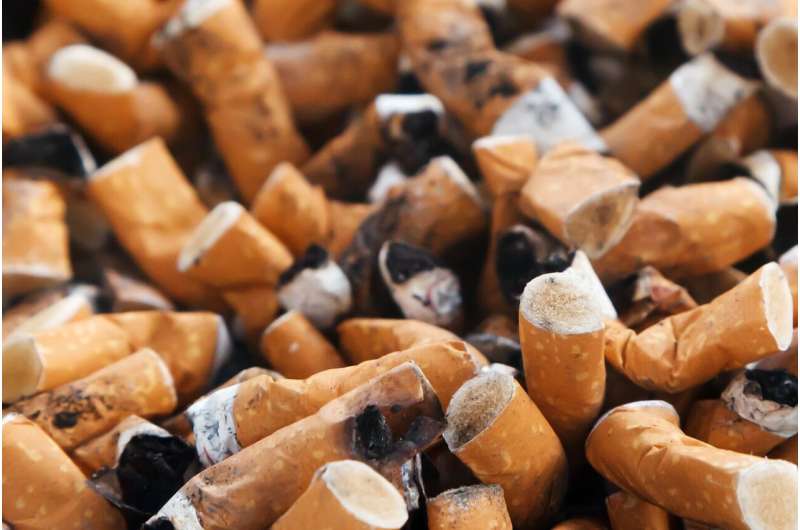This article has been reviewed according to Science X's editorial process and policies. Editors have highlighted the following attributes while ensuring the content's credibility:
fact-checked
peer-reviewed publication
trusted source
proofread
Plastic pollution from cigarette butts likely costs US $26 billion/year

The costs of environmental pollution caused by plastics in cigarette butts and packaging amount to an estimated US $26 billion every year or US $186 billion every 10 years—adjusted for inflation—in waste management and marine ecosystem damage worldwide, finds a data analysis published online in the journal Tobacco Control.
These costs may seem small compared with the overall economic and human toll of tobacco, but they are cumulative and preventable, the researcher Deborah K Sy highlights. Although great strides have been made in developing policies to curb or ban single-use plastics around the globe, tobacco's plastic has also been overlooked, she adds.
This is despite the fact that cigarette filters—the main component of cigarette butts—are the most common item of rubbish collected on the planet. They are made of single-use plastic.
To try to gauge the global economic toll of tobacco products' toxic waste, and better inform tobacco control and environmental protection agencies, the researcher drew on currently available public data sources for cigarette sales, clean-up costs, and plastic waste on land and sea.
These sources included the World Bank, the Organization for Economic Cooperation and Development (OECD),The Tobacco Atlas, and the World Wildlife Fund.
The average weight of each plastic filter is 3.4g. As cigarette butts are often littered along with plastic packaging, which weighs an average 19g for a standard pack size of 20 cigarettes, this was also included in the calculations.
The researcher estimated the annual and 10-year projections of the environmental and economic costs of tobacco plastic based on the tonnage. Ten-year projections were included because cigarette butts are reported to take 10 years to degrade.
The total figure reflects cost estimates of cleanup and disposal (adjusted for inflation) of the total plastic generated by filtered cigarette sales potentially ending up as waste in the sea, landfills, or in the environment.
The researcher estimated that the annual economic cost of cigarette plastics waste is around US $26 billion, made up of US $20.7 billion in marine ecosystem damage and US$5 billion in waste management costs, adding up to an adjusted US $186 billion over 10 years.
"Although this amount is small compared with the annual economic losses from tobacco (US$1.4 trillion per year) and may appear insignificant compared with the 8 million deaths attributable to tobacco each year, these environmental costs should not be downplayed as these are accumulating and are preventable," emphasizes Sy.
Countries with the highest number of cigarette butts are mostly low and middle-income countries—the same countries where the "leakage" rate for plastics into the environment, thought to be between 1% and 14%, is likely higher, she adds.
The costs of tobacco product plastic pollution are likely highest in China, Indonesia, Japan, Bangladesh and the Philippines, the estimates suggest.
The researcher acknowledges that the figures are only estimates, but they are likely to be conservative, she says, because they don't account for the toxic metals and chemicals in cigarette butts that accrue over time, making them more harmful than general plastic waste.
"Cigarette filters have been polluting our oceans and land for at least five decades, and these trash items may have a carrier effect with the toxic chemicals leached from them. Human and ecosystem impacts of this toxic chemical accumulation are unknown," Sy writes.
"The general estimates provided here could provide fiscal evidence of the need to mitigate tobacco plastic waste pollution," and the data could help "in assigning industry responsibility for these losses, including that of the [tobacco industry]," she suggests.
Policies to shift the responsibility for the clean-up costs to the tobacco industry are under consideration in France, the U.K., the European Union and the U.S., Sy adds.
More information: Deborah K Sy, Tobacco industry accountability for marine pollution: country and global estimates, Tobacco Control (2023). DOI: 10.1136/tc-2022-057795
Journal information: Tobacco Control
Provided by British Medical Journal





















